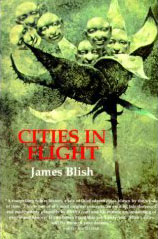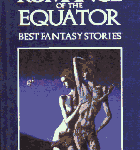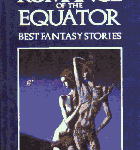Brian Aldiss talks to James Blish
ALDISS: James Blish, first of all I think I should congratulate you on surviving four years in England! May I say on behalf of myself, if of no one else, that it’s a great pleasure to have you here; I personally count it as one of the major pleasures of my life that you are over here, and have managed to stay for four years without getting kicked out. The first question stems directly from these four years, and, like all the questions, it’s going to be impossible to answer. Can you give us some sort of feeling of whether and how you feel the stay in England – or to put it another way – the exile from the States, has affected you and your writing?
BLISH: I think I can answer that quite clearly. In the first place I am not an exile, I am an immigrant. I came here because I loved England on my first few acquaintances with it, and Judy did too. I was actually headed for Italy when I stopped off here, and I felt no reason to go any further. I am not an exile, political or otherwise, from the U.S.A.; I am here because I like England better in general than I do the States. It has benefited me because it has made it financially possible for me to live on my income from writing, which I could not do, under the terms I demand, in the U.S.A. Here everything seems to be made for me. It’s not ideal. Every earthly paradise has a snake in it, and I’ve met a few. On the whole, I feel more at home here, and find more things I love here, than I do in my own country; and to this I should add that I have lived in, worked in, or vacationed in twenty-eight of the American states, and that’s not counting any I have simply passed through or passed over. Of course, there are still vast sections of my own country that I have never seen at all; this includes the Pacific Northwest, which everyone tells me is very beautiful, and the desert states-but I feel no attraction to the desert states. I would like to see Oregon, I’ve seen San Francisco, which I loved, and Los Angeles, which I hated. I have in fact, pretty much, for my own purposes, exhausted America. I didn’t come to this decision lightly. Every day here I find more and more things that I love, that are personal to me, that enrich me, whereas in the States I was finding fewer and fewer.
ALDISS: I remember the first time you walked around All Souls, Oxford, the sense of homecoming you had then.
BLISH: I still feel that many years after, it was in 1965, was it not? After the London Worldcon. I still feel that; I turn around every corner in England and find things that are part of my heritage. My bank in London has a blue circle on it saying that Charles Dickens once lived there; about three blocks away, near my publishers, is a little tiny church which is called “The Church of Chimney Sweeps,” it was one of the first churches built in London after the great fire. It’s called “The Church of Chimney Sweeps” because, every Christmas, Lord somebody or other gathered together all the chimney sweeps in London and threw them a big blast on Christmas Eve. I am not, as a matter of fact, anything like a recent Englishman, my wife is much more so, one of her grand parents was Scottish, the other was English. The most remote ancestor that I can trace is one Abraham Blish, who, by God, came over on the Mayflower. And I consider that makes me just as English as Judy.
ALDISS: I feel that part of the attraction of England is the academic associations, which obviously have a great appeal for you. I can see you fitting in very well with All Souls, which we both know, at least tangentially. We could talk about this very pleasantly for a long time, but, I think, we should move on to a leading question that I have lined up. When I first came across your writing, and noted your name, was with “Bridge” in Campbell’s Astounding in 1952. It was an early bit of the Cities in Flight series. One of the things that made me take notice of the “Okies”, as we then knew them, was that there was a certain academic strain in them. This is something that I think I detected very early, but which is now more apparent in your writing. I would like to ask you now specifically about the strictly contemporary interpretation of Cities in Flight. It’s very easy to be wise now, but you were writing those stories in the fifties when the emphasis in Astounding was on power politics and power fantasy, and your stories showed the Okies going out into the galaxy – that old van Vogtian and Asimovian galaxy – not for conquest, but for work. You’re on record in The Issue at Hand as saying that the whole of the Cities in Flight series derived from a four page letter from John W. Campbell; and that, for the next few years, you hacked your way through it sentence by sentence. This to me is one of the agreeable ways in which you underestimate yourself. The question I finally get around to delivering is this: were you conscious at the time that you were departing from what I would regard as the Campbellian norm, or did you feel yourself fitting in very happily there?
BLISH: I was conscious that I was departing from the Campbellian norm, but only semiconscious. The first Okie story to be written was called “Earthman, Come Home”; I came at this by an entirely roundabout way in 1948. There was a cover on an issue of Astounding for that period, for a van Vogt story I cannot identify, showing a van Vogtian superman standing in what looked like a spaceship yard filled with towering phallic shapes; this, at first glance, I took to be a city and not a spaceship yard. It occurred to me, suddenly, that if you have antigravity, there’s no reason why there should be any limitation on the size or shape of the objects you lift. It was at that point that it also occurred to me: why should you want to do that? It was then that the concept of migrant workers came to me. Campbell contributed many, many ideas in that famous four-page letter that I hadn’t thought up. He rejected the story with this four-page letter. The main thing that he did contribute, the central idea, was that the most valuable thing that these migrant workers could transfer in a situation involving fast interstellar travel was not gold, uranium, diamonds, the ability to drill for oil or whatever, but information. These are the pollinating bees of the galaxy. That was Campbell’s idea, not mine, and it became the central idea of the whole series, it absolutely ruled out power politics in the old E. E. Smith or intergalactic epic sense. I did use a certain amount of power politics, however, because the cities are competing with each other. I used political figures of varying degrees of intelligence manoeuvring against each other, and a social situation on Earth, with Earth both protecting the cities and policing them at the same time. Here I went back to an American analogy. There are two kinds of hobos in America; the ordinary migrant worker who goes from door to door saying “Can I chop wood, or do any other job you have around, for which you will give me a lard sandwich and a glass of water?”; he carries all his worldly possessions bound up in a bandanna on a stick over his shoulder – this is known as a bindle. The other kind of tramp we have in America exists by robbing the others, and he’s known as a bindlestiff; he does no work, but exists by robbing his fellows. I set up that situation between the cities, and this, to me, seemed to be much more interesting than interstellar wheeler-dealer politics. As a matter of fact, by and large, I don’t like wheeler-dealer characters. All the characters you find in conventional interstellar intrigue turn out to be generals, or dictators of the galaxy; my people were to be work horses involved in intrigue with each other, and never mind the wheeler-dealer, they were wheeler dealers within their own small compass. I was, without realising it, quite tired of the kind of SF story in which the leading character rises from lieutenant-general to ruler of the galaxy, I just got fed up to the teeth with it. Therefore my migrants, carrying their information and operating their small intrigues, seemed to me to be much more interesting as humans, and more fun to work with. I didn’t realise I was departing from the Campbellian norm, but in the long run I did.
ALDISS: One sees these things, of course, by hindsight. Looking back for Billion Year Spree I came across this departure that SF had evolved in the pulps, where the hooker was always part fantasy, and that the supreme power fantasies – greater than Doc Savage, The Shadow and all the rest – were SF because there you had the extra powers you couldn’t conjure in any other way. This was the secret of Campbell’s success, and although you seemed to fit in there well because you had the highly developed technology, and all the other integrals of Campbell’s Astounding, you were, nevertheless, departing slowly by doing away with the conquests of the galaxy, which, after all, were the ultimate in power fantasy, and this became more noticeable as the series went on.
ALDISS: One sees these things, of course, by hindsight. Looking back for Billion Year Spree I came across this departure that SF had evolved in the pulps, where the hooker was always part fantasy, and that the supreme power fantasies – greater than Doc Savage, The Shadow and all the rest – were SF because there you had the extra powers you couldn’t conjure in any other way. This was the secret of Campbell’s success, and although you seemed to fit in there well because you had the highly developed technology, and all the other integrals of Campbell’s Astounding, you were, nevertheless, departing slowly by doing away with the conquests of the galaxy, which, after all, were the ultimate in power fantasy, and this became more noticeable as the series went on.
BLISH: I did some of the Okie stories before I did “Bridge.” It was only later on that I came to realise that before I got my cities into the sky we needed two fundamental discoveries. One of these was the faster-than-light drive involved, and the other was a way of achieving longevity – often mistakenly referred to as immortality, my people were not immortal, they simply lived very long lives. So I wrote two stories to show how these discoveries were made. “Bridge” is the story of the discovery of the interstellar drive, and it’s all done in terms of the little technicians who have to work on the bridge on Jupiter, who don’t know why they are there, or why they should be plunged into this hell. The other one took place mostly on Earth, in a pharmaceutical company where they were working on the problem of longevity. There again you have minor characters being involved who don’t know what’s going on. I then tied these stories together with an Alaskan senator, who knows what both projects are about, and is doomed to death if anyone discovers what he’s up to, and I do kill him off at the end. That made a third story. I made a triple sandwich of this to make a novel, which is a prequel to Earthman, Come Home. By that time I was working on a smaller scale than I was when I conceived the Okie society as a whole, because I wanted to show how it all started. So, in what I originally called They Shall Have Stars, which is still titled that in England, I was going down smaller than before. I think the signal quality of “Bridge,” apart from the fact that it is faithful to what I know about Jupiter, or knew about Jupiter at the time, was that nobody who was actually working on the bridge knew what they were doing, and they were, in several ways, in revolt against it, they couldn’t see any sense in it; it was just another multi billion dollar project in which they were cogs, and their emotions were not considered. I think perhaps that’s why you remember that story. It did not, however, come first, it was a conscious narrowing of focus.
ALDISS: The last of the Cities in Flight series was A Clash of Cymbals. I suppose that marked one of the points in your evolution; because for the first time we see the emergence of what I think is one of your major preoccupations, which is with – and I don’t know the grand title for it – something like “the end of things”. You have returned to “the end of things” over and over again, and have shown it in various ways. There’s a beautiful novel which Faber published as a juvenile, which is about the end of the universe and has angels in it!
BLISH: There are two such books, one a sequel to the other, but I don’t feel they deal with the end of things. The two books with the angels in them deal with the possible incorporation of the Earth into a galactic system which is some one hundred thousand years in the future. By our own actions and abilities we have set back that date by about twenty-five thousand years, but still the incorporation is far ahead. In an independent story, which is in neither of these books, I raise the question of whether we really want to be in this galactic organisation. It appears to be very ugly the more we look at it. The first book is called The Star Dwellers and the second Mission to the Heart Stars.
ALDISS: The end of things crops up again at the end of your other phase of writing with those two magnificent books Black Easter and The Day After Judgement.
BLISH: Well now, Brian, I want to make another differentiation here. I seldom really like to deal with the end of things; I like to leave the end of things up to the reader, as I did in A Case of Conscience. I never tell anybody what I think the actual ending is. In the same way, in Black Easter and The Day After Judgement. Black Easter apparently ends with Armageddon and the triumph of the Devil. The Day After Judgement is a demonstration of something that was said, I think by Voltaire, that if the Devil ever did triumph it would be incumbent upon him to take upon himself the attributes of God. My further point on this was that it would be impossible for the Devil to do, and therefore it would fall upon us to do it. This is not the end of something, it is the beginning of something else. Again, this happens hundreds of thousands of years in the future, or at the end of eternity. We may or may not manage the job. This all started with the ending of the Cities in Flight series, which was essentially, to my view, a novel of how people, including very young people, might react in their very different ways if they knew the exact day of their deaths. That is a novel of finality, and you will remember that at the end of the novel we revert to Amalfi, who has always been my central figure, and some slight hope is given that even this apparent ultimate disaster might be survived in some way, with some fragments of one’s personality left. Amalfi says no, he’s lived so long and seen so much, and been in charge of so much of his universe, that he knows all the nuts and bolts are coming out of it, and he’s dead tired.
ALDISS: I will be repentant to this degree: let’s do away with this phrase “the end of things” and use your word – “finality”. I always regard you as a novelist of finality. This is the essence that I get most powerfully from your novels, and that I like very much. We’re going to have to skate over the whole indulgent thing I wanted you to do, discussing some of my favourite stories, but I at least insist on listing them. You’ll be happy to know that “Surface Tension” is not among them. I doted on “Bridge” and I doted on “Beep”, which I think is marvellous and I doted on “Common Time”, which, again, is absolutely splendid; it is exactly the right length for the content, and this is rare in SF, as I think you’ll agree. I would like you, for posterity, to recite your anecdote on what happened at Heath House when I was entertaining you and Harry Harrison, and you revealed to us that you were going to write a sequel to Black Easter.
BLISH: When I finished Black Easter I thought I had finished it. It turned out to be the most commercially successful novel I have ever written; it eventually got 78 reviews in general newspapers in the States, newspapers which almost never notice SF at all, or fantasy; most of the reviews were highly favourable, and the book sold like mad. There could be no more final and black an ending for a novel than Black Easter, so my editor at Doubleday said “how about a sequel?” At Heath House, with you and Margaret and Judy and Harry, I mentioned this mad project, and tried to see how I could undertake it. Harry, who is a master of the overreaction, threw up his hands, staggered backwards across the room, brought up against the wall with his hands thrown up against it, clasped his brow, then he stopped and thought about it for a moment, and said “Well, meanwhile in another universe very similar to ours . . . “, which I thought was a great opening sentence. It would, of course, have been out of the terms of any possible sequel to Black Easter.
ALDISS: One of the beautiful and silencing things about the sequel, which I refuse to accept as a sequel, is that the join is seamless; you actually take up from the very next sentence, and that extraordinary Breughelesque ending just goes on into the next book.
BLISH: I’m glad to hear this because I no longer regard them as two books. I hope that when the New York edition of After Such Knowledge appears this will be a trilogy, not a tetralogy, in which Black Easter and The Day After Judgement will be put together as one book without the synopsis that I opened The Day After Judgement with, then, I think perhaps it will be smooth and seamless.
ALDISS: I wish you would forget that title, but I know you are very addicted to it.
BLISH: I’m wedded to it. This is because all four of my characters are allegorical characters; at the end of The Day After Judgement all four turn out to be epitomies of deadly sins, that’s why they find themselves in this position at the end
ALDISS: So that I don’t appear entirely as a claque in this discussion let me offer you a quotation from the worthy Philip Strick who talks about Blish’s “glacial surfaces.” I know what he means by that; I wonder if you do?
BLISH: This has often puzzled me. So many people have said that my writing is cold, in one way or another, that I must assume it to be true. Now, when I hear it from Harlan Ellison, who lives at the top of his voice, I discount it, but Harlan is not the only one to have said it by any means, I’ve recently seen it in fanzines. I’m supposed to be an intellectual writer with virtually no emotional content, and I do not understand this. It seems to me, that at least in my best work, there is a great deal of emotional content, and I could tell you of scenes in some of my work that I have wept over because I did not want them to happen, but I saw from the logic of the stories they had to happen that way. Perhaps “glacial surface” is simply a way of saying that while I am writing a story which I think has emotional content, I am, at the same time, trying to get things right. I also like to present characters arguing at their best, so as to make issues clear, so that I can get on to the emotional involvements and outcomes which come from apparently abstract questions. This is my whole principle in writing a science-fiction story that I take seriously, particularly if I start with the background. The next question I ask myself after I’ve looked at this background and worked it out is “who does this hurt?” – and the person that background hurts most becomes my central character.
ALDISS: I think you’ve approached very close to the heart of the matter, but the answer to this must be that you place the emphasis on the “hurt” all the time – not on the warmth but the chill of hurt. You know how I admire Black Easter and The Day After Judgement; precisely what I like about them is what I like in what is for me the best of your writing, which is the hurt and the glacial surfaces. There are plenty of people around spewing raw emotion; your virtue is that you are one of the intellectuals of the field, and I would hate to think that you were ever on the defensive about it.
BLISH: I am not defensive about it, it is one of the qualities of my writing that I value. In Foundation 3, Poul Anderson says that Heinlein has been insufficiently credited for realising that love is tragic; this does not prevent him from valuing love, and showing that he values it. I think, whether this is actually true of Heinlein or not, it’s much more true of Poul it is an insight that I value enormously. It becomes more valuable, and more complicated, and more to be valued, when you realise that you do have, and are constantly driving, Plato’s two horses, Reason and Passion. Which one is on top depends not on the horses but on the driver. What I want to do is to produce work which contains passion controlled by reason, in as an exact a balance as I, as a driver, can achieve.







